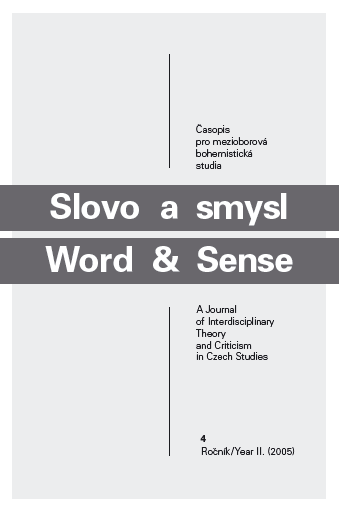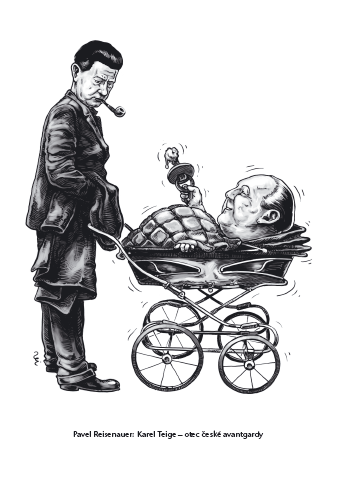Czech Studies at Columbia University
NEW YORK CITY
Columbia University, located in New York City, is one of the few institutions in the United States that grants both M.A. and Ph.D. degrees in Czech language and literature. Since 2001 Christopher Harwood has been offering a wide range of courses in the Slavic Department: Intermediate Czech; Readings in Czech Literature (fifth-semester Czech); Writers of Prague, looking primarily at works by German, Jewish and Czech writers written between 1895 and 1938; Postwar Czech Literature; and Czech Culture before Czechoslovakia. The latter is a new course that broadly surveys Czech literature from the tenth to the early twentieth century with significant excursions into historiography, music, visual arts and architecture, focusing on questions of the cultural canon, national identity and myth. Chris also guides students engaged in independent studies of Czech literature and dissertation writing. He is currently working on a book on the semantics of garbage in Czech and Russian literature and recently present a paper entitled “The Troubled Ecology of Ivan Klíma's Love and Garbage" at the December 2005 conference of the Association of American Teachers of Slavic and East European Languages (AATSEEL), one of the principal forums for Slavists in the States. Marcela Rydlová-Ehrlich, translator and editor of an anthology of Czech love poetry, has also recently taught Czech language classes, postwar Czech Literature (with Peter Kussi), Readings in Czech Literature, and Prague Spring: 1968 in Film and Literature, as well as offering guidance for independent projects. In addition, Czech and Slovak students and students of Czech meet weekly at a local restaurant to practice their language skills over drinks at the Czech conversation hour, led by Marcela, Chris, Jeff Barreith or myself, Kristen Lodge. At the end of each semester we gather at one of the Czech restaurants in nearby Astoria, Queens, to celebrate with a Czech meal and, of course, Czech beer. These meetings allow us to use our language skills for social as well as academic purposes.
Moreover, graduate students in any field from all universities in the New York area (mainly Columbia and New York University) who specialize in central Europe may attend a monthly workshop to discuss work voluntarily submitted for critique, including dissertation chapters, conference papers and fellowship proposals. This extremely helpful forum, which brings together students of various disciplines, is led by Columbia professor Bradley Abrams, a specialist in central European history, author of The Struggle for the Soul of the Nation: Czech Culture and the Rise of Communism. Brad is currently working on two book manuscripts, one on central European left-wing politics, and the second entitled Normalizing the Socialist Good Life: Consumption, Consumerism and Political Legitimacy in Czechoslovakia after the Prague Spring.
Finally, Columbia students may take a break from academics to benefit from the numerous Czech-related events held in New York City, including films, lectures and readings sponsored by the Czech Center; an annual festival of recent Czech films at BAM Cinema in Brooklyn, with talks by the directors; and lectures and guest visits at Columbia's Harriman Institute. The latter is a valuable resource, offering certificates in the study of either Russia or central and eastern Europe and encouraging students to study multiple disciplines (e.g., history, politics, economics and literature) rather than a single subject within the field. Columbia is also home to the School of International and Public Affairs, where those interested in international relations may choose to focus on central and eastern Europe.
Another faculty member who writes about Czech society is Gil Eyal of the Sociology Department, whose book The Origins of Postcommunist Elites: From the Prague Spring to the Breakup of Czechoslovakia was published in 2003. This work offers a sociological explanation for the breakup of Czechoslovakia focusing on the role played by Czech and Slovak political and intellectual elites. Last year he published a continuation of this project entitled "Identity and Trauama” dealing with the different forms memory took in the two republics of Czechoslovakia, in the journal History and Memory.
Karin Beck and I are the current candidates for a double Ph.D. in Russian and Czech language and literature. Karin, who wrote her M.A. thesis on Jáchym Topol's City Sister Silver is now writing a dissertation on the use of foreign languages in Czech and Russian literature. She recently gave a conference paper on Jaroslav Hašek. I am currently writing a dissertation comparing Decadence in French, Russian and Czech literature, and I have a minor in central and eastern European film, with a special interest in the Czech New Wave. I recently gave a paper at the AATSEEL conference in December on the 1890s debate in Czech journals on exploiting literary Decadence for radical political ends. Jeff Barreith, another Slavic Department student, has recently earned a Master's degree for his thesis on Vítězslav Nezval's turn from Poetist to Surrealist poetics and has started work toward a Ph.D. in Comparative Literature. He is planning to write his dissertation on Czech modernism and its relation to European trends, especially French. He is also interested in anarchism in early twentieth-century Czech literature. In recent years we graduate students have been teaching first-year Czech. Of my own first-semester class of twelve students, both undergraduate and graduate, seven spent the following semester on a study abroad program in Prague studying various subjects from economics to literature.
Many Russianists in the Slavic Department minor in Czech as their second Slavic language. Among them is Andrew Hicks, who has given a paper entitled “Karel Havlíček Borovský and Russophilia’s Aftermath" and has written the Americal subtitles for Jan Svěrák’s film Kolja. Not all graduate students interested in Czech and Slovak studies are in the Slavic Department, however: Rebekah Klein of the History Department is completing a dissertation on Slovak Jewry, and Krista Hegburg of the Anthropology Department is writing a dissertation on Holocaust reparations to Jews, Roma and former political prisoners that is both historical/archival and ethnographic. She recently taught anthropology with a strong Czech component at the University of Lower Silesia in Wroclaw. Kimberly Elman Zarecor of Columbia's School of Architecture, soon to defend a dissertation on early postwar housing in Czechoslovakia, is starting this year in her new position as assistant professor at Iowa State University. Like myself, both Krista and Kim were awarded Fulbright-Hays fellowships for extensive dissertation research in the Czech Republic. Other sources of funding for students of Czech language and culture include the Harriman Institute and federally funded Foreign Language and Area Studies fellowships.
Recent graduates specializing in Czech literature include David Cooper, now teaching at the University of Illinois at Urbana-Champaign, who wrote his M.A. thesis on Božena Němcová's Grandmother and a dissertation entitled Inventing a National Literature: Czech and Russian Criticism 1800-1830. David recently published an anthology of Slovak folktales in his own translation. Eagle Glassheim, who several years ago defended a dissertation in the History Department on nobles and nationality politics in Czechoslovakia between 1918 and 1948, is now teaching at the University of British Columbia in Vancouver. His book Noble Nationalists: The Transformation of the Bohemian Aristocracy is forthcoming.
As for the history of the Czech language and literature program, Columbia University has been teaching Czech, with periodic interruptions, since 1917. In 1926 Clarence A. Manning, chairman of the Slavic Department, with the support of University President Nicholas Murray Butler, pushed unsuccessfully to set up a center for Czechoslovak Studies at Columbia. It was not until after World War II that the Masaryk Chair of Czech Studies was established. The Chair, which has since been abolished, was held first by the renowned Slavic literary scholar and theoretician Roman Jakobson and subsequently by the historian Otakar Odložilík, author of studies on the Hussites, George of Poděbrady, Jan Amos Komenský, the Czech nobility 1620-1740, the Czechs on the eve of 1848, T. G. Masaryk and Czech missionaries in New Spain. William Harkins, a prolific translator of Czech literature and author of numerous works, including The Russian Folk Epos in Czech Literature 1800 — 1900 and Pragmatism and the Czech "Pragmatist Generation," taught Czech language and literature at Columbia for about forty years, beginning in 1949. Harkins has also co-authored A Modern Czech Grammar and edited anthologies of Czech and Slovak literature. Another gifted translator, Peter Kussi, who has rendered Karel Čapek, Karel Poláček, Milan Kundera, Jiří Gruša and Josef Škvorecý into English, joined the faculty in the late 1970s and taught in the Slavic Department until his retirement in 2001. Kussi also co-authored an intermediate Czech textbook and wrote The Good Soldier Švejk as a Novel of the Grotesque.
The faculty and students of Columbia University have thus greatly contributed to Czech studies in the past, and they continue to do so in the present. Anyone with an interest in the Czech Republic will find valuable academic, social and cultural opportunities both at the University and in New York City itself.
Kirsten Lodge
Columbia University


